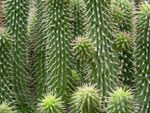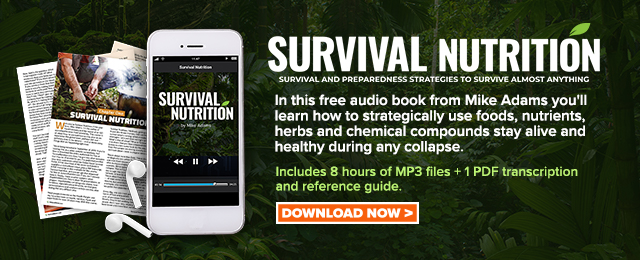
Hoodia Gordonii emerges as natural appetite suppressant with weight loss potential
 Monday, November 29, 2004 Monday, November 29, 2004by Mike Adams, the Health Ranger Editor of NaturalNews.com (See all articles...) Tags: hoodia, health news, Natural News |
- Hidden poison in your medicine and supplements: How phthalates in capsules are silently attacking your heart, thyroid, and hormones
- EU court exposes secret Pfizer deal, orders von der Leyen and Bourla to reveal concealed texts
- When the storm brings spies: How a top weather app became an agent of surveillance
- Hidden betrayal: Moderna and Pfizer shots hijack immune cells to rewrite mRNA, prolonging spike protein production
- Renegade cardiologist joins MAHA, demands immediate halt to mRNA vaccines and overhaul of US health policies
- OUTRAGE: Georgia shields pesticide giants from cancer lawsuits as corporate lobbying silences victims
- Lard: A highly nutritious but misunderstood superfood
- Health Ranger Report: Dr. Alphonzo Monzo discusses nanotechnology, 5G and the weaponization of health
- Judge rules Kansas vaccine lawsuit against Pfizer must proceed in state court
- CLIMATE PONZI SCHEME DENIED: Trump begins the exit of the BIGGEST WASTE of money, resources and human lives ever and the climate alarmists are freaking out
- The great awakening: How people are questioning power structures and embracing truth
- The mouth-brain connection: Could dental health guard against dementia (and vice versa)?
- Breakthrough study reveals how Epstein-Barr and a gene variant heighten multiple sclerosis risk
- Kraft Heinz pours $3 billion into U.S. factories as Trump tariffs reshape manufacturing
- Rudolf Breuss introduces a natural approach to treating cancer and chronic illness in “The Breuss Cancer Cure”
- Pfizer’s election meddling exposed: Top scientists weaponized science to sway the 2020 vote, so they could benefit from unlawful mandates
- Coinbase faces $400M fallout after insider-led phishing attack exposes customer data
- Thwarted ISIS plot on Michigan military base highlights ongoing domestic terror threat
- WAR ON COGNITION: The Coordinated Assault on Your Brain and How to Defend Yourself Against Every Attack
- Singapore's draconian vaccine mandate: Citizens face jail time for refusing FORCED medical procedures that do HARM
- Big Pharma's Dirty Secret: How Prescription Drugs Are Starving Your Body of Essential Nutrients
- Canada's COVID cover-up: Health officials swore secrecy to protect Trudeau from vaccine scandal
- RED ALERT: Nuclear War Between India and Pakistan Could Trigger Global Catastrophe… full RISK ANALYSIS
- JESUS NEVER SPOKE ENGLISH: Historical facts on why the Bible you’re probably reading has been altered, redacted or hidden from much of its original meaning
- Gene-edited pork sneaks onto your plate: FDA quietly approves CRISPR pigs amid health and ethical concerns
- Silent catastrophe: COVID-19 vaccines linked to plummeting fertility rates, Czech data reveals
- Why All Government Officials and Big Tech CEOs Who Engage in Systematic Viewpoint Censorship Must Be ARRESTED, Prosecuted, and Sentenced to Life in Prison
- Brushing with poison: Study finds toxic heavy metals in 90% of toothpaste brands, including those for children
- Survival basics: 5 Dangerous locations to avoid during an EMP attack
- BBC accused of “political censorship” for shelving Gaza documentary amid mounting pressure
- EU embraces censorship over solutions as energy grid crises spark blackout fears
- Health Ranger Report: Christopher Bjerknes challenges conventional narratives about world history
- Australia’s vaccine cover-up: 35 died same day as COVID shot, but authorities ignored them
- Landmark study of 85 million reveals shocking surge in heart attacks, strokes, and sudden death following the notorious COVID-19 jab
- Hidden poison in your medicine and supplements: How phthalates in capsules are silently attacking your heart, thyroid, and hormones
- The truth about Benzyl Alcohol in beauty products
- The Miraculous Healing Power of DMSO: Nature's Forgotten Cure for Cancer, Pain, and Regeneration
- Biblical truth: God will carry out a “cosmic reset” of Earth and destroy all human civilization with a series of extinction-level cosmic impacts known as The Seven Trumpets, Seven Bowls and Seven Seals
- URGENT REPORT: The China Import Embargo - What to Stockpile Now Before America Runs Out
- The Ultimate Survival Guide to Baking Soda: A Miraculous, Multi-Purpose Remedy for Health, Home, and Emergency Preparedness
- Widespread social and economic unrest: Steve Quayle issues urgent financial warning of imminent asset collapse in new interview with Mike Adams
- Aerosolized bioweapons? Strange “diploid biomasses” falling out of the sky in Florida captured under the microscope
- A call to preserve America’s future: “Defeating Big Government Socialism” by Newt Gingrich
- Stunning Visualization of the Seven Trumpets in the Book of Revelation
- Big Pharma launches “Vaccine Integrity Project” to combat Secretary Kennedy and keep 94 shots going into kids with mandates and liability protections
- World Economic Forum's current downfall exposes legacy of totalitarianism, financial fraud, and crimes against humanity
- Biden regime deployed over 600 grants to fund disinformation agenda, to silence the truth and stifle debate
- The Miraculous Healing Power of Green Tea: Unlocking the Potent Antioxidants That Big Pharma Doesn't Want You to Know About
- The unspoken truth about chemotherapy: These “treatments” create toxic time bombs in your body called CELL-KILLING PARTICLES
- U.S. Government's Bio-War Against America: 15 Historical Medical Horrors Inflicted on the American People by the Government Itself
- A win for free speech: State Department SHUTS DOWN controversial disinformation office
- U.S. demands U.K. protect FREE SPEECH, repeal hate speech authoritarianism, in latest trade deal negotiations
- French rioting demonstrates how gun control laws are failing law-abiding citizens
- Head of L.A. Port warns of incoming plunge in U.S. supply chain, empty shelves and inventory depletion in 5-7 weeks
- Red Cross issues warning to stop blood plasma donations from vaccinated people
- Scientists confirm: GENIUS brain function can be spontaneously unleashed in humans without any apparent cause
- EPA advisor admits the agency is funneling billions to climate groups ahead of Trump’s return to White House
- HYSSOP: What research reveals about the health benefits of this ancient holy herb
- Two containers with completed ballots fall out of truck in Florida
- Newly released JFK files reveal Pentagon's role in creating Lyme disease and covid in the same lab
- Mike Adams releases country western hit single: Goin’ Back in Time is Comin’ Home
- Global leaders unite to clamp down on “misinformation” with UN-backed Cascais Declaration
- BREAKING: 2025 NDAA authorizes mandatory military draft of WOMEN across America… as Pentagon pursues global NUCLEAR war with both Russia and China at the same time
- I Want My Bailout Money – new song released by Mike Adams
- Michael Yon warns of a ZIONIST TAKEOVER in Trump’s second administration
- Ozempic and Wegovy weight loss drugs are injectable LIZARD VENOM PEPTIDES that may unleash a devastating wave of organ failure… side effects align with symptoms of SNAKE BITES
- The Health Ranger releases “Vaccine Zombie” song and music video, using AI-animated zombies for the music video
- BOMBSHELL: DNA testing kits are a SCAM to develop ethnic-specific bioweapons
- These 13 countries just signed an agreement to engineer a global FAMINE by destroying food supply
- Israeli soldiers accused of even more torture and abuse in the West Bank
- RFK Jr. clears key hurdle: Sen. Susan Collins backs controversial HHS nominee, signaling a new era for health policy
- Sermon 30: How Jesus reveals Caesar’s FAKE CURRENCY and FALSE AUTHORITY
For most people, that's the whole solution right there. Turn off the hunger and almost anybody can lose weight. If you have absolutely no craving for food, and your body isn't tricking you into eating another tub of ice cream by creating the illusion of hunger, then you've got the problem solved.
If you add in a bit of exercise -- say, 30 minutes of walking each day -- suddenly you're boosting your metabolism naturally and you're not stuffing your face with twice as many calories as you burned during the walk.
If you could turn off your hunger, you could lose weight without needing military discipline. I hate to say the word "automatically," because I think you still have to be responsible in how you approach your diet, but turning off the hunger is as close to automatic weight loss as you can get.
A double-blind placebo trial showed rapid, consistent weight loss
Although the hoodia trials conducted so far have been rather small, researchers put this to the test in a clinical trial in Leicester, England. Volunteers were either given a placebo or an extract of the hoodia gordonii plant, then were told to go about their business. None exercised at all. They watched TV, read books, ate and slept.After 15 days, the results showed that the group on the hoodia extract had reduced their caloric intake by 1,000 calories per day, automatically, with no effort whatsoever. They weren't even aware of the effect. But they were automatically eating less, and they weren't exercising at all.
Now let's put this into perspective with two facts:
- The average American needs around 2,200 calories per day.
- There are around 3,500 calories in a pound of body fat. Burn an extra 3,500 calories, and you've lost a pound of fat.
In this study, people taking the hoodia extract automatically ate 1,000 fewer calories per day. Do that for 3.5 days and you've lost 3,500 calories, right? That's a pound of body fat.
Do that for a week and you've lost two pounds of body fat. Two pounds of fat a week is twice the weight loss rate attempted by most weight loss strategies. It's aggressive weight loss. It means you could lose eight pounds a month, or as much as 100 pounds a year.
Eight pounds a month is extraordinary. Most people who are serious about weight loss are thrilled with one pound a week. Yet people are apparently achieving twice that with hoodia.
The great hoodia shortage
As you might expect from the situation, there's skyrocketing demand for hoodia (and most people still haven't heard of it yet!). Hoodia plants are extremely difficult to come by. I personally spent over eight hours searching for plants, and finally found a small 2" high hoodia plant which I had to pay $65 to get (most succulents that size sell for around five or six dollars) from eBay. I actually had to bid on this plant!I also paid $15 for fifteen hoodia seeds, which are microscopic, almost like dust. That makes hoodia seeds more valuable than gold, ounce per ounce.
All over the world, people are trying to buy hoodia, and there just isn't enough supply to go around. The succulent growers have been wiped out. The seed providers have virtually no inventory left. And since hoodia takes more than six years to grow to harvesting height, there's going to continue to be a great hoodia shortage until at least 2010, maybe beyond.
Hoodia is also known by horticulture experts as being extremely difficult to cultivate in captivity. The plants rot easily, and they won't grow in regular soil -- they need sandy soil with excellent drainage. Also, to make things even more difficult, these plants aren't pollinated by bees, they're pollinated by flies. To attract the flies, their blooms emit a strong, repulsive odor that smells a lot like rotting flesh (no kidding). It's so repulsive that some growers claim, "It makes you want to chuck your cookies." And as a result, there's not a whole lot of people who want to grow this plant in their backyards or indoors. As you might have guessed, it remains rare.
So buying hoodia is very difficult. It's expensive. And, naturally, there are a lot of fakes on the market.
In part four of this investigative report, we'll reveal how much of the hoodia being sold on the 'net is actually counterfeit hoodia and what you can do to protect yourself against hoodia con artists. Watch NewsTarget.com for the next article, or just use the Google search box below to search for hoodia (which will bring up all the articles on hoodia available so far).
Hoodia at FETCH.news
Get independent news alerts on natural cures, food lab tests, cannabis medicine, science, robotics, drones, privacy and more.
 About the author:Mike Adams (aka the "Health Ranger") is a best selling author (#1 best selling science book on Amazon.com) and a globally recognized scientific researcher in clean foods. He serves as the founding editor of NaturalNews.com and the lab science director of an internationally accredited (ISO 17025) analytical laboratory known as CWC Labs. There, he was awarded a Certificate of Excellence for achieving extremely high accuracy in the analysis of toxic elements in unknown water samples using ICP-MS instrumentation. Adams is also highly proficient in running liquid chromatography, ion chromatography and mass spectrometry time-of-flight analytical instrumentation.
About the author:Mike Adams (aka the "Health Ranger") is a best selling author (#1 best selling science book on Amazon.com) and a globally recognized scientific researcher in clean foods. He serves as the founding editor of NaturalNews.com and the lab science director of an internationally accredited (ISO 17025) analytical laboratory known as CWC Labs. There, he was awarded a Certificate of Excellence for achieving extremely high accuracy in the analysis of toxic elements in unknown water samples using ICP-MS instrumentation. Adams is also highly proficient in running liquid chromatography, ion chromatography and mass spectrometry time-of-flight analytical instrumentation.
Adams is a person of color whose ancestors include Africans and Native American Indians. He's also of Native American heritage, which he credits as inspiring his "Health Ranger" passion for protecting life and nature against the destruction caused by chemicals, heavy metals and other forms of pollution.
Adams is the founder and publisher of the open source science journal Natural Science Journal, the author of numerous peer-reviewed science papers published by the journal, and the author of the world's first book that published ICP-MS heavy metals analysis results for foods, dietary supplements, pet food, spices and fast food. The book is entitled Food Forensics and is published by BenBella Books.
In his laboratory research, Adams has made numerous food safety breakthroughs such as revealing rice protein products imported from Asia to be contaminated with toxic heavy metals like lead, cadmium and tungsten. Adams was the first food science researcher to document high levels of tungsten in superfoods. He also discovered over 11 ppm lead in imported mangosteen powder, and led an industry-wide voluntary agreement to limit heavy metals in rice protein products.
In addition to his lab work, Adams is also the (non-paid) executive director of the non-profit Consumer Wellness Center (CWC), an organization that redirects 100% of its donations receipts to grant programs that teach children and women how to grow their own food or vastly improve their nutrition. Through the non-profit CWC, Adams also launched Nutrition Rescue, a program that donates essential vitamins to people in need. Click here to see some of the CWC success stories.
With a background in science and software technology, Adams is the original founder of the email newsletter technology company known as Arial Software. Using his technical experience combined with his love for natural health, Adams developed and deployed the content management system currently driving NaturalNews.com. He also engineered the high-level statistical algorithms that power SCIENCE.naturalnews.com, a massive research resource featuring over 10 million scientific studies.
Adams is well known for his incredibly popular consumer activism video blowing the lid on fake blueberries used throughout the food supply. He has also exposed "strange fibers" found in Chicken McNuggets, fake academic credentials of so-called health "gurus," dangerous "detox" products imported as battery acid and sold for oral consumption, fake acai berry scams, the California raw milk raids, the vaccine research fraud revealed by industry whistleblowers and many other topics.
Adams has also helped defend the rights of home gardeners and protect the medical freedom rights of parents. Adams is widely recognized to have made a remarkable global impact on issues like GMOs, vaccines, nutrition therapies, human consciousness.
In addition to his activism, Adams is an accomplished musician who has released over a dozen popular songs covering a variety of activism topics.
Click here to read a more detailed bio on Mike Adams, the Health Ranger, at HealthRanger.com.
Take Action: Support Natural News by linking to this article from your website
Permalink to this article:
Embed article link: (copy HTML code below):
Reprinting this article:
Non-commercial use OK, cite NaturalNews.com with clickable link.
Follow Natural News on Facebook, Twitter, Google Plus, and Pinterest
Science News & Studies
Medicine News and Information
Food News & Studies
Health News & Studies
Herbs News & Information
Pollution News & Studies
Cancer News & Studies
Climate News & Studies
Survival News & Information
Gear News & Information
News covering technology, stocks, hackers, and more



"Big Tech and mainstream media are constantly trying to silence the independent voices that dare to bring you the truth about toxic food ingredients, dangerous medications and the failed, fraudulent science of the profit-driven medical establishment.
Email is one of the best ways to make sure you stay informed, without the censorship of the tech giants (Google, Apple, Facebook, Twitter, YouTube, etc.). Stay informed and you'll even likely learn information that may help save your own life."
–The Health Ranger, Mike Adams













































